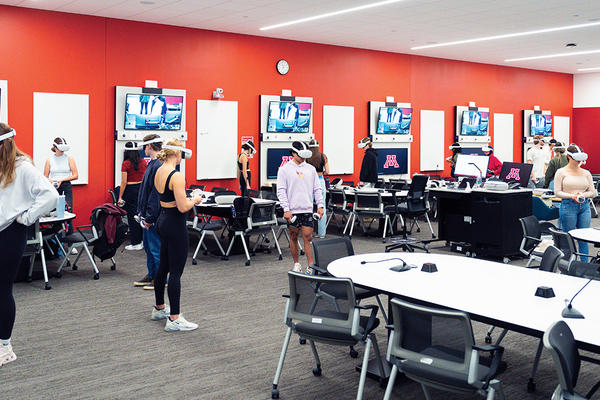Leveraging generative AI to modernize nursing education
Michalowski urges nurse educators to harness the potential of generative AI
May 13, 2024
Brett Stursa

Martin Michalowski
The proliferation of new generative artificial intelligence (AI) tools can be challenging for nurse educators and clinicians to keep up with, as the potential benefits also come with new challenges.
Associate Professor Martin Michalowski, PhD, FAMIA, examines generative AI in nursing education and provides recommendations for nurse educators to optimize its use in recent publications.
Michalowski’s most recent article, The ChatGPT Effect: Nursing Education and Generative Artificial Intelligence, published in the February issue of the Journal of Nursing Education, examines generative AI in nursing education more broadly and urges nurse educators to harness its potential.
Prompt engineering when using generative AI in nursing education, published in the January issue of Nurse Education in Practice, makes recommendations to integrate prompt engineering — the process of refining questions to get better results — in nursing education.
“Generative AI is one of the key required competencies and it needs to be integrated into the education nurses receive both as concepts to understand and as tools to use,” says Michalowski. “Similar to concepts in machine learning, natural language processing, automated reasoning, and other AI subfields, generative AI is transforming the provision of care. Therefore, it is important that nurses understand how to use it, and how its use impacts health care systems, providers and patients.”
Currently, he says that the most effective uses of generative AI in nursing classrooms is creating mock patient-related data and providing patient scenarios for practice.
“When applying learned theories or tools where patient-related data is needed, generative AI models are very useful for building synthetic data in different formats, like tables, free text notes, etc.,” says Michalowski.
“Additionally, generative AI enables critical thinking through the creation of patient use cases/scenarios. This application is one of the few where hallucinations — presenting output patterns as fact while they are clinically or factually incorrect — is acceptable. Students need to apply what they learned and use critical thinking to identify inaccuracies and contradictions in the use case. The instructor can also tailor the output use cases by providing important context for the learning exercise.”
Michalowski says it’s imperative nurse educators integrate AI competencies into their classrooms to ensure students are well equipped as future clinicians.
“Nurses have an incredible opportunity to lead health care’s transformation of clinical care with AI. They touch all aspects of the care process, understand the clinical problems and interface with patients. They are positioned to be the bridge between AI developers, health care practitioners and stakeholders,” says Michalowski. “However, to fully realize this potential they need basic AI competencies that aren’t currently part of their education.”


